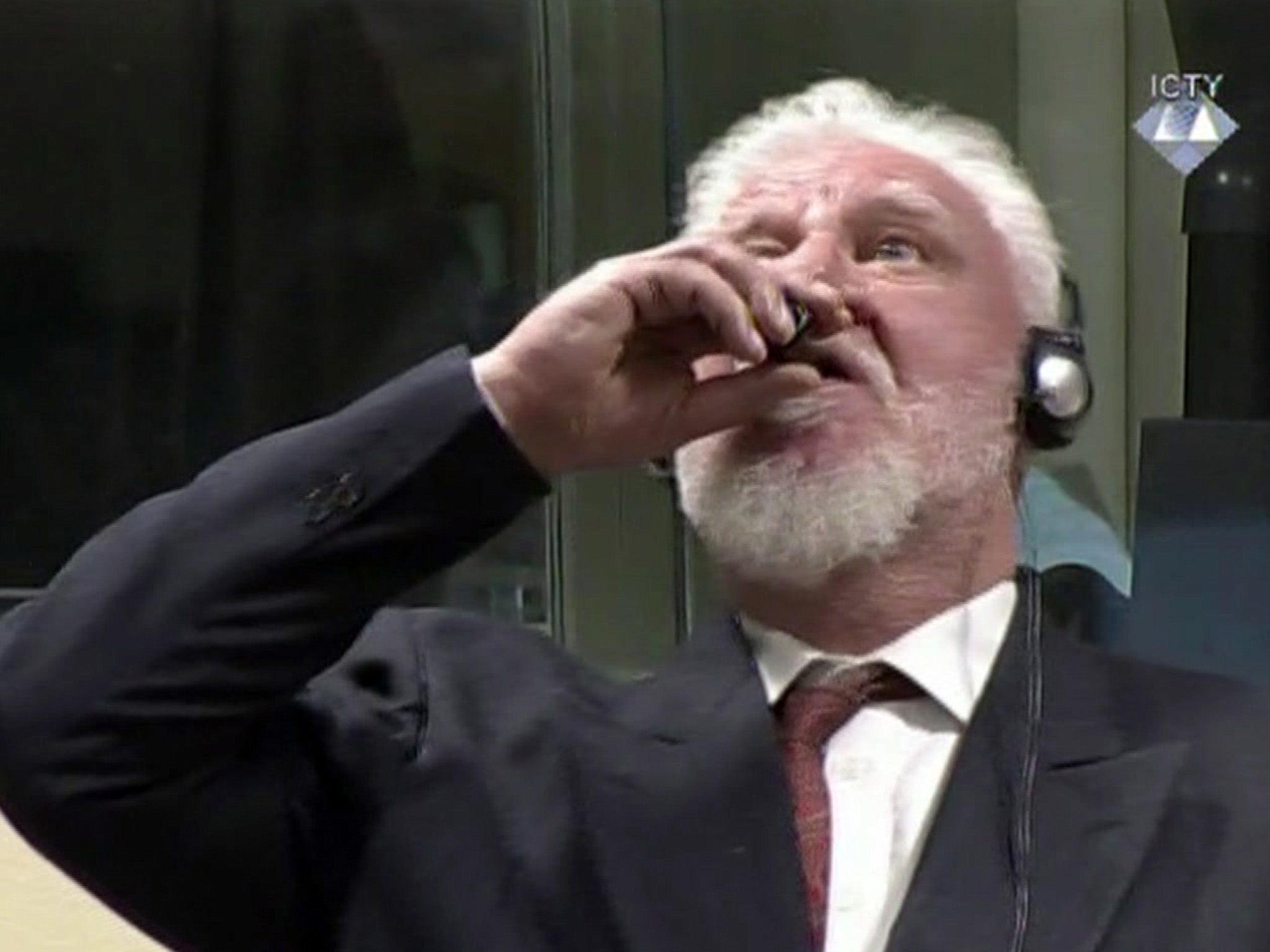War criminal Slobodan Praljak dies in hospital after drinking 'poison' upon hearing guilty verdict at The Hague
The court says Dutch authorities have opened an investigation into the death

Your support helps us to tell the story
From reproductive rights to climate change to Big Tech, The Independent is on the ground when the story is developing. Whether it's investigating the financials of Elon Musk's pro-Trump PAC or producing our latest documentary, 'The A Word', which shines a light on the American women fighting for reproductive rights, we know how important it is to parse out the facts from the messaging.
At such a critical moment in US history, we need reporters on the ground. Your donation allows us to keep sending journalists to speak to both sides of the story.
The Independent is trusted by Americans across the entire political spectrum. And unlike many other quality news outlets, we choose not to lock Americans out of our reporting and analysis with paywalls. We believe quality journalism should be available to everyone, paid for by those who can afford it.
Your support makes all the difference.There were dramatic scenes at the International Criminal Court in the Hague on Wednesday as a former general appeared to poison himself upon hearing he was guilty of war crimes.
Slobodan Praljak a 72-year-old Bosnian Croat who was on trial for crimes committed during the 1990s, appeared to drink from a vial of liquid and later died in hospital.
The case raises serious questions as to how the suspect was able to enter the courtroom with an apparently deadly poison. A prominent lawyer at the court said he could see how it would be “absolutely possible” to smuggle such an object in.
The moment Praljak drank from the small bottle was, like the rest of the hearing, streamed live on TV and online. Shortly after the verdict confirming his 20-year jail sentence is read out, Praljak stands and says – through translators – “Slobodan Praljak is not a war criminal, I am rejecting the court ruling”, before raising a small container to his lips.
The court appeared keen to carry on with proceedings, before Praljak told his translators: “I have taken poison.”
The court judge suspended the session, closing off cameras and ordering the container held by Praljak to be retained – presumably as evidence.
Reporters on the scene said a helicopter could be heard overhead and paramedics with backpacks could be seen entering the chamber of the court.
An ambulance was called to take Praljak to hospital where he was later pronounced dead.
Prominent Serbian lawyer Toma Fila, who has frequently defended suspects at the UN war crimes court in the Netherlands, said it would be easy to bring poison into the court.
He told the Associated Press that security for lawyers and other court staff “is just like at an airport”.
Mr Fila said: “They inspect metal objects, like belts, metal money, shoes, and take away mobile phones.” He added that “pills and small quantities of liquids” would not be registered.
Praljak was one of six Bosnian Croat leaders attending an appeals judgement at the court, having been previously jailed for 20 years in 2013.
He was again found guilty of committing atrocities in the Bosnian mountain town of Mostar during the Croat-Bosnik war, a conflict between ethnic Bosniaks and ethnic Croats living in Bosnia – which was itself a part of the larger Bosnian war.
During the wider 1992-1995 war the breakaway Croat forces, which were backed by Croatia, mostly sided with the Bosniaks against the breakaway Bosnian Serb republic, which was backed by Serbia.
But for around a year, centring on 1993, the Croats and Bosniaks also fought each other. During this time Mr Praljak, a senior commander in the Bosnian Croat forces, was found to have taken no serious action to stop his soldiers from rounding up Muslims.
The trial was part of the International Criminal Tribunal for the former Yugoslavia, which was set up in 1993 on mandate from the UN Security Council and which will see its mandate expire at the end of the year.
Join our commenting forum
Join thought-provoking conversations, follow other Independent readers and see their replies
Comments